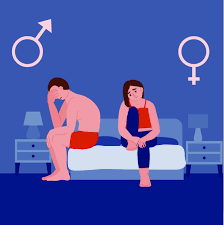 Characterized by disturbances in sexual desire and in psychophysiological changes that are associated with the sexual response cycle.
Characterized by disturbances in sexual desire and in psychophysiological changes that are associated with the sexual response cycle.
Sexual dysfunction, negatively affects mental health, vitality, and social functioning, and has an effect on quality of life of similar in magnitude to that associated with chronic back pain or diabetes.
The explanation of either an organic or a psychological explanation has been replaced by the understanding that the two processes are combined.
Psychological factors can modulate immune, inflammatory, endocrine and neurologic factors related to sexuality.
Medical illnesses have psychological implications and cause pathophysiological alterations.
Phases of sexual cycle are excitement, plateau, orgasm and resolution which correspond to physiologic changes in men and women and are used to define sexual dysfunction by the American Psychiatric Association’s Diagnostic and Statistical Manual (DSM-IV).
More women complain of some compromise than men, 43% and 31%, respectively.
A complex process caused by disturbances in normal sexual response cycle with anatomic, physiologic, psychologic and social factors having an influence.
Prevalence is approximately 42% in premenopausal women and 88% in postmenopausal females.
Common complaints include impaired vaginal lubrication and pain during intercourse.
